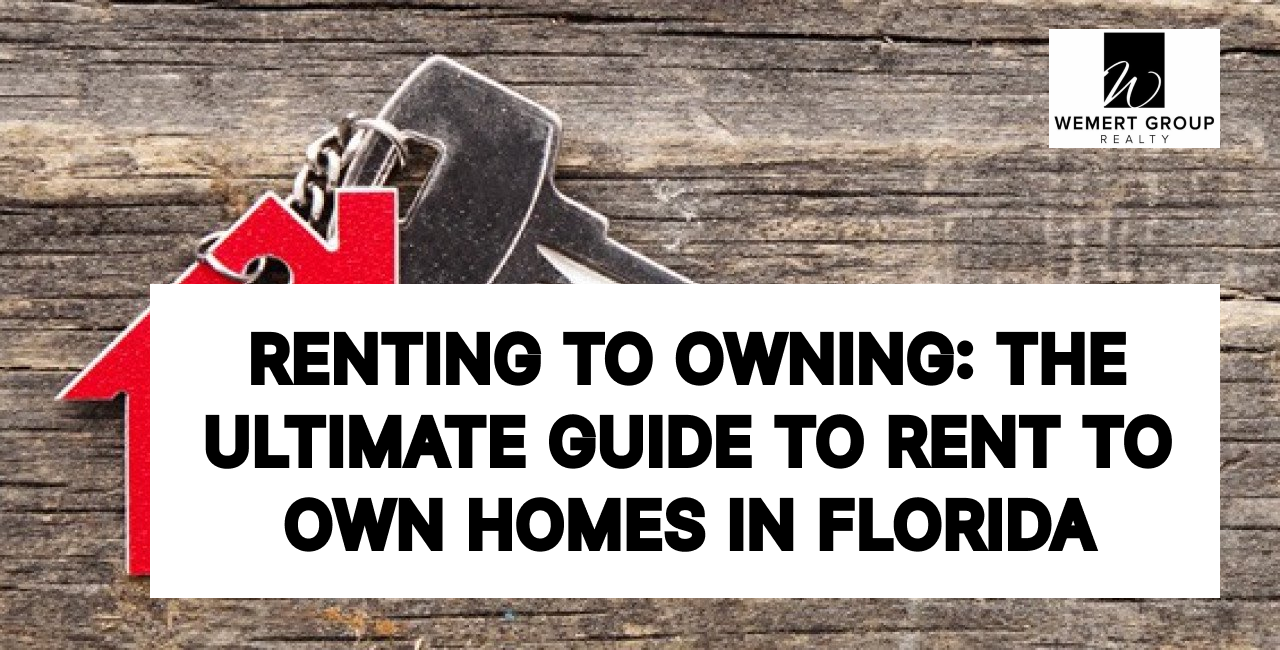Navigating the path from renting to homeownership can seem daunting, especially in a dynamic real estate market like Florida’s. However, rent-to-own homes in Florida offer a unique opportunity to bridge the gap between renting and owning, providing a practical solution for those who have yet to be ready for traditional homeownership. This guide will delve into the complexities and advantages of the rent-to-own process, equipping you with essential knowledge and practical steps to transition smoothly from a tenant to a homeowner.
Understanding Rent-to-Own Homes
Rent-to-own homes in Florida present a viable option for many potential homeowners. This arrangement allows renters to enter into an agreement where they rent a home with the future option to buy. Key components of these agreements typically include an option fee, which is a one-time, non-refundable fee paid upfront to secure the option to purchase the home later; rent premiums, which are additional amounts on top of the usual rent, applied as a credit toward the purchase price; and the lease agreement itself, which stipulates the rental term before the purchase option can be exercised.
Understanding how rent-to-own homes work in Florida is crucial, as it differs from traditional home buying. The rent-to-own process offers advantages such as locking in a purchase price at today’s market rate, even if the actual purchase is several years in the future, potentially leading to significant savings if property values in the area increase. However, potential drawbacks include the risk of losing the option fee and rent premiums if you decide not to purchase the home or fail to qualify for a mortgage at the end of the lease term. Weighing these pros and cons is essential for anyone considering this path to homeownership.
Why Consider Rent to Own in Florida?

The allure of rent-to-own homes in Florida is enhanced by several factors unique to the Sunshine State. Florida’s real estate market has been characterized by steady growth, making it an attractive location for investors and homebuyers alike. Furthermore, the state’s favorable tax laws, which include no state income tax and property tax exemptions for residents, make it an economically advantageous place for long-term investment.
Considering rent-to-own homes with low monthly payments can also be particularly appealing in Florida, where traditional home ownership may be out of reach for many due to high down payment requirements and stringent credit qualifications. Rent-to-own agreements can offer lower and more manageable monthly payments, providing a feasible pathway to homeownership for those who are building their credit or saving for a future down payment. Moreover, these arrangements can provide the time needed to improve one’s financial standing, ultimately facilitating the transition from renter to homeowner without the immediate financial strain that often comes with purchasing a home outright.
These initial chapters lay the groundwork for understanding the rent-to-own process, emphasizing its practicality and potential in Florida’s real estate landscape. As we proceed, the subsequent sections will offer a more detailed exploration of finding rent-to-own properties, navigating financial preparations, and finalizing the purchase, ensuring you are well-equipped to embark on your journey from renting to owning in Florida.
How Rent to Own Works in Florida
Understanding the mechanics of how rent-to-own homes work in Florida is essential for anyone considering this pathway to homeownership. In Florida, as in other states, a rent-to-own agreement typically involves two main elements: the lease agreement and the option to purchase. The lease agreement operates like a standard rental contract, defining the terms under which you will rent the home. However, what sets rent-to-own apart is the option to purchase, which grants you the right to buy the home at a predetermined price before the lease expires.
To secure this option, you typically pay an option fee at the start of your lease. This fee is often a percentage of the home’s purchase price and is usually non-refundable, but it secures your exclusive right to buy the property. Additionally, a portion of your monthly rent payments will include rent premiums. These premiums are over and above the market rate for rent and will contribute towards the down payment of the home if you decide to exercise your purchase option. This setup is particularly advantageous as it builds a portion of your monthly rent into a form of savings for a down payment, making the eventual transition to homeowner smoother and financially feasible.
Legal considerations in Florida also play a crucial role in these agreements. The state mandates specific disclosures and conditions in rent-to-own contracts to protect both buyers and sellers. For instance, sellers must ensure that the terms of the lease and purchase agreement are clear and that the property title has no undisclosed liens or encumbrances. For buyers, it’s important to understand that failing to exercise the purchase option means forfeiting the option fee and any rent premiums paid, emphasizing the need for thorough financial planning and advisement.
Finding Rent to Own Properties in Florida

Finding rent-to-own homes in Florida requires diligent research and a strategic approach. Start by identifying the areas you are interested in living. Consider factors like employment opportunities, school districts, neighborhood safety, and local amenities. Once you have a location in mind, several resources can help you find available rent-to-own properties. Online real estate listings, local real estate agents who specialize in rent-to-own arrangements, and even local real estate investor meetups can be valuable resources.
When searching for rent-to-own homes with low monthly payments, it’s crucial to compare the terms offered by different sellers. Some properties might offer lower monthly payments but require higher option fees or longer lease terms. Engage a real estate agent familiar with such deals to help you navigate these options and negotiate the best terms. It’s also advisable to get pre-qualification advice from a mortgage broker to understand your financial standing and how it will affect your ability to purchase the home at the end of the lease term.
Another strategy to find good rent-to-own homes is to look for sellers who are motivated to move their properties quickly due to personal circumstances like relocation, financial challenges, or a change in family status. These sellers are often more willing to consider rent-to-own arrangements as a viable option to sell their homes. Additionally, understanding common pitfalls, such as neglecting property inspections or not consulting with a real estate attorney, can save you from potential future complications.
Navigating through the intricacies of rent-to-own properties in Florida can be complex, but with the right knowledge and resources, it’s a viable and rewarding option. The subsequent sections will delve deeper into the financial preparations required for these arrangements and outline the final steps to take as you transition from renter to homeowner, ensuring you are fully equipped to make informed decisions on your journey to homeownership.
Financing a Rent to Own Home
Navigating the financial aspects of rent-to-own homes in Florida is a critical step in the journey from renting to ownership. While the structure of rent-to-own agreements offers a unique pathway to homeownership, understanding and preparing for the financial implications is crucial. For many prospective buyers, the primary appeal of a rent-to-own agreement is the ability to lock in a purchase price and accumulate a down payment over time through rent premiums. However, securing the necessary financing at the end of the rental period is an essential component of successfully converting from a renter to a homeowner.
The first step in preparing for financing is to understand your current financial status and how it will impact your ability to secure a mortgage in the future. This involves assessing your credit score, debt-to-income ratio, and overall financial stability. Rent-to-own homes can be particularly advantageous for individuals who are currently unable to qualify for a mortgage due to credit issues. During the rental period, you have the opportunity to improve your credit score by consistently paying rent on time and reducing your overall debt load. Engaging with a financial advisor or a credit counseling service can provide strategies to enhance your creditworthiness over the lease term.
Moreover, it’s important to explore different mortgage options available to you in Florida. Traditional mortgages are the most common, but there are also FHA loans, which require lower down payments and are easier to qualify for if you have less-than-perfect credit. VA loans could be an option if you are a veteran, offering significant benefits, including no down payment and no private mortgage insurance. Understanding these options will help you prepare for the financial requirements you’ll face at the end of your rent-to-own agreement.
In addition to securing a mortgage, you must also prepare for other financial aspects of purchasing a home. This includes having funds set aside for closing costs, which can range from 2% to 5% of the purchase price, and ensuring you have a buffer for any immediate home repairs or renovations that might be necessary. Proper financial planning during the rental period can significantly ease the transition to homeownership, making it a smoother and more successful experience.
Finalizing the Purchase

As the rental period nears its conclusion and you prepare to exercise your option to purchase, several key steps must be followed to finalize the transition from renting to owning a home in Florida. The culmination of the rent-to-own process is a critical phase where thorough preparation and attention to detail are paramount.
First, it’s essential to conduct a thorough home inspection. This step is crucial, even if you have been living in the home, as it can uncover potential issues that may not be visible during day-to-day living. Depending on the findings, you may need to negotiate repairs with the seller or adjust the final purchase price. Similarly, a home appraisal must be conducted to ensure that the home’s value aligns with the agreed-upon purchase price. This is especially important for securing mortgage approval, as lenders will base their loan amount on the lesser of the appraisal value or the purchase price.
The next step involves finalizing your mortgage. By this stage, if you have taken the earlier advice on improving your financial standing and exploring your mortgage options, securing financing should be feasible. It’s important to compare offers from multiple lenders to ensure you are getting the best interest rates and terms available.
Finally, you’ll move forward with closing the deal. This involves reviewing and signing a multitude of legal documents, a process that should be navigated with the assistance of a real estate attorney to ensure all terms are understood, and your interests are protected. Once the paperwork is finalized, the keys are yours, and you officially transition from a renter to a homeowner.
Successfully navigating the rent-to-own process in Florida requires a well-planned approach, from understanding and entering the initial agreement to securing financing and finalizing the purchase. This guide provides a comprehensive roadmap for prospective buyers considering rent-to-own homes as a viable path to homeownership, ensuring they are well-equipped with the knowledge and strategies needed for a successful transition.
Navigating Legal and Regulatory Considerations
Before you officially become the owner of a rent-to-own home in Florida, it’s crucial to understand the legal and regulatory framework that governs these transactions. Florida’s real estate laws are designed to protect both the buyer and seller, but specific attention must be paid to the unique aspects of rent-to-own agreements. Legal compliance not only prevents future disputes but also ensures that both parties’ rights are protected throughout the process.
Key legal considerations in Florida include ensuring that all terms of the rent-to-own agreement are clearly stated and understood. This includes the purchase price, the duration of the rental period, the portion of rent applied to the purchase price, and the terms under which either party may terminate the agreement. It is also vital to verify that the property title is clear of any liens or encumbrances that could complicate or invalidate the future sale. Engaging a real estate attorney to review all documentation before signing can provide an additional layer of security and legal insight.
Additionally, Florida statutes may dictate specific disclosures that must be made by the seller, such as the presence of lead-based paint or flood risk. These disclosures are particularly important in ensuring that you, as the buyer, are fully aware of the property’s condition and any potential risks. Compliance with these regulatory requirements not only facilitates a smoother transaction but also helps in building a transparent relationship between buyer and seller.
Enhancing Your Home’s Value During the Rent-to-Own Period

While you are still in the rent-to-own phase, there are strategic improvements you can make to enhance the value of the home. Since you have an interest in eventually owning the property, investing in upgrades or renovations can not only improve your living experience but also potentially increase the home’s market value. Simple improvements such as repainting, updating fixtures, and landscaping can significantly boost appeal and functionality.
However, it’s important to communicate with the seller before making any significant changes. In some rent-to-own agreements, alterations need to be approved by the seller to avoid any conflicts. Determining which types of improvements are allowed and how they will affect the eventual purchase can be a key part of your strategy to increase home value.
Building Equity Through Rent-to-Own
One of the most significant benefits of rent-to-own homes in Florida is the ability to build equity through rent premiums. A portion of each month’s rent payment goes towards the purchase price, which not only helps in accumulating a down payment but also builds your stake in the property. This arrangement can be particularly advantageous if the property value increases over the term of your lease, potentially increasing your equity before you even officially own the home.
By the time you are ready to purchase the home, you could have a substantial amount of equity built up, reducing the amount you need to finance through a mortgage. This can result in lower monthly mortgage payments and less total interest paid over the life of the loan, making homeownership more affordable and accessible.
Conclusion: Making the Leap from Renter to Homeowner
The journey from renting to owning a home in Florida through a rent-to-own agreement is unique but highly rewarding. By understanding and leveraging the specific opportunities and challenges of the rent-to-own process, you can effectively navigate your path to homeownership. Remember, successful rent-to-own transactions are built on a foundation of thorough preparation, legal compliance, and proactive financial management.
As you approach the end of your rent-to-own agreement, ensure that all the necessary steps have been taken to secure financing, finalize legal documents, and ensure the property meets your needs and expectations. With careful planning and informed decisions, transitioning from a renter to a homeowner can be a smooth and fulfilling experience, allowing you to achieve your dream of homeownership in Florida with confidence and success.

